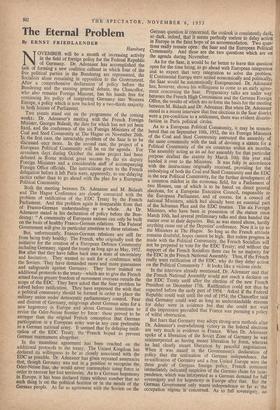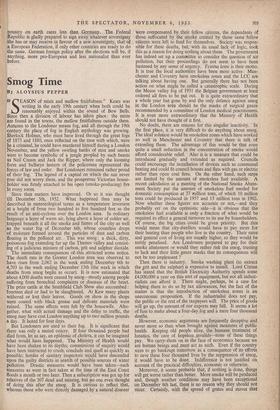The Eternal Problem
By ERNST FRIEDLAENDER Hamburg NOVEMBER will be a month of increasing activity in the field of foreign policy for the Federal Republic of Germany. Dr. Adenauer has accomplished the task of forming a new coalition cabinet in which four of the five political parties in the Bundestag are represented, the Socialists alone remaining in opposition to the Government. After a comprehensive declaration of policy before the Bundestag and the ensuing general, debate, the Chancellor, who also remains Foreign Minister, has his hands free for continuing his policy of integrating Germany into Western Europe, a policy which is now backed by a two-thirds majority in both houses of Parliament.
Two events stand out on the programme of the coming weeks: Dr. Adenauer's meeting with the French Foreign Minister, Georges Bidault, the date for which has not yet been fixed, and the conference of the six. Foreign Ministers of the Coal and Steel Community at The Hague on November 26th. In the first case, the intractable problem of the Saar is to be discpssed once more. In the second case, the project of a European Political Community will be on the agenda. For seventeen days during October the same project had been debated in Rome without great success by the six deputy Foreign Ministers and a considerable staff of accompanying Foreign Office officials. The instructions given to the French delegation before it left Paris were, apparently, to use delaying tactics rather than to go ahead with the plan for a European Political Community.
Both the meeting between Dr. Adenauer and M. Bidault and The Hague Conference are closely connected with the problem of ratification of the EDC Treaty by the French Parliament. And this problem again is inseparable from that of Franco-German understanding as a whole. As Dr. Adenauer stated in his declaration of policy before the Bun- destag: " A community of European nations can only be built on the basis of healthy Franco-German relations. The Federal Government will give its particular attention to these relations."
But, unfortunately, Franco-German relations are still far from being truly healthy. The French, who originally took the initiative for the creation of a European Defence Community including Germany, signed the treaty as long ago as May, 1952. Butt after that they have fallen back into a state of uncertainty and hesitation. They wanted to wait for a conference with the Soviets. They have demanded more and more guarantees and safeguards against Germany. They have insisted on additional protocols to the treaty—which are to give the French armed forces greater freedom of movement overseas outside the scope of the EDC. They have asked that the Saar problem be solved before ratification. They have expressed the wish that a political community should be formed in order to place the military union under democratic parliamentary control. Fear and distrust of Germany, misgivings about German aims for a new hegemony in Europe and about German intentions to revise the Oder-Neisse frontier by force: these proved to be stronger than the original French conception that German participation in a European army was-in any case preferable to a German national army. It seemed that by delaying ratifi- cation of the EDC Treaty, the French hoped to prevent German rearmament altogether.
In the meantime agreement has been reached on the additional protocols to the treaty. The United Kingdom has declared its willingness to be as closely associated with the EDC as possible. Dr. Adenauer has given repeated assurances that, though Germany was not in a position to recognise the Oder-Neisse line, she would never contemplate using force in order to recover her lost territories. As to a German hegemony in Europe, it has been declared times without number that no such thing is on the political horizon or in the minds of the German people. As far as agreement with the Soviets on the German question is concerned, the outlook is consistently dark, so dark, indeed, that it seems perfectly useless to delay action in Europe in the faint hope of an .accommodation. Two ques- tions really remain open: the. Saar and the European Political Community. And these are the two questions which are on the agenda during November.
As for the Saar, it would be far better to leave this question open for the time being, to go ahead with European integration and to expect that very integration to solve the problem. If Continental Europe were united economically and politically, the Saar would be automatically Europeanised. Dr. Adenauer has, however, shown his willingness to come to an early agree- ment concerning the Saar. Preparatory talks are under way between the French High Commission and the German Foreign Office, the results of which are to form the basis for the meeting between M. Bidault and Dr. Adenauer. But when Dr. Adenauer stated in a recent interview that free elections in the Saar district were a pre-condition to a settlement, there was evident dissatis- faction in Paris political circles.
As to a European Political Community, it may be remem- bered that on September 10th, 1952, the six Foreign Ministers of the Coal and Steel Community entrusted the assembly of the same community with the task of devising a statute for a Political Community of the six countries within six months. The assembly acting as an ad hoc assembly for that particular purpose drafted the statute by March 10th this year and handed it over to the Ministers. It was fully in accordance with the instructions originally received, providing for the embodying of both the Coal and Steel Community and the EDC in the new Political Community, for the further development of a common market in the economic field, for a Parliament of two Houses, one of which is to be based on direct general elections, for a European Executive Council, responsible to the European Parliament, and of course, for a council of national Ministers, which had already been an essential part of the Schuman Plan and the EDC treaties. The six Foreign Ministers, who have been in possession of the statute since March 10th, had several preliminary talks and then handed the matter over to their deputies. But, as was stated above, hardly anything came out of the Deputies' conference. Now it is up to the Ministers at The Hague. So long as the French attitude remains doubtful, hopes cannot be high. But unless progress is made with the Political Community. the French Socialists will not be prepared to vote for the EDC Treaty; and without the support of the French Socialists there can be no majority for the EDC in the French National Assembly. Thus, if the Frbnch really want ratification of the EDC, why do they delay action on the Political Community ? It looks like a vicious circle.
In the interview already mentioned, Dr. Adenauer said that the French National Assembly would not reach a decision on the EDC Treaty until after the election of the new French President on December 17th. Ratification could not thus be expected before the early part of 1954. Asked if the Federal Republic could wait until the end of 1954, the Chancellor said that Germany could wait as long as understandable reasons for delay were in evidence but that she could not wait if the impression prevailed that France was pursuing a policy of wilful obstruction.
But fears that Germany may adopt strong-arm methods after Dr. Adenauer's overwhelming victory in the federal elections are very much in evidence in France. When Dr. Adenauer spoke of a liberation of the Soviet Zone of Germany he was misinterpreted as having meant liberation by force, whereas he had clearly meant liberation by peaceful negotiations. When it was stated in the Government's declaration of policy that the restoration of German independence, the re-unification of Germany and a free United Europe were the three goals of German foreign policy, French h comment immediately indicated suspicion of the German claim for inde- pendence, which was interpreted as a German demand for full sovereignty and for hegemony in Europe after that. But the German Government only wants independence so far as the occupation regime is concerned. As to full sovereignty, no country on earth cares less than Germany. The Federal Republic is gladly prepared to sign away whatever sovereignty she has or may receive in favour of a new sovereignty, that of a European Federation, if only other countries are ready to do the same. German foreign policy after the elections will be, if anything, more pro-European and less nationalist than ever before.



































 Previous page
Previous page